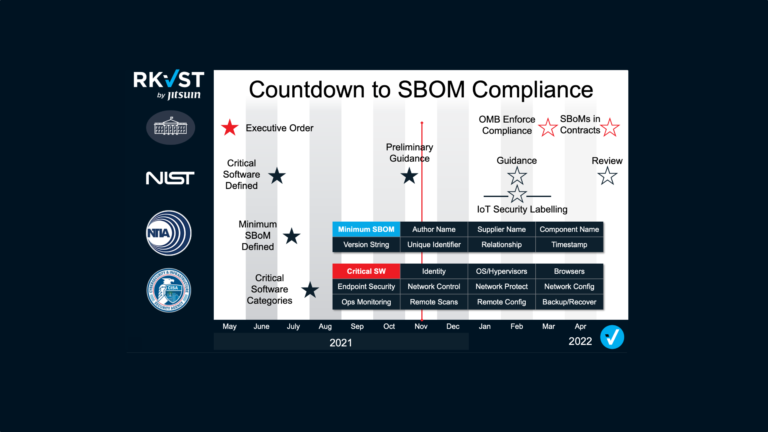
Artificial Intelligence (AI) has emerged as a transformative force, reshaping industries, societies, and the way we live and work. The profound impact of AI is evident in virtually every facet of our lives, from personalized recommendations on streaming platforms to the automation of complex tasks in many industries.
Join us on this data-driven journey to unravel the multifaceted world of AI and explore the numbers that underpin its significance in our rapidly evolving digital era.
Key Findings
Table of Contents
- General AI Statistics
- Artificial Intelligence Adoption
- Businesses Using Artificial Intelligence
- The Impact of AI on Employment
- AI Trust and User Sentiment
- AI’s Future Projections
General AI Statistics
In marketing, AI tools are the star of the moment. Since ChatGPT came into the picture in late 2022, more people are using AI, more money is going into research, and strategies for securing and efficiently implementing these cutting-edge tools have been devised.
The global AI market is set to grow significantly from 2018 to 2030, with varying predictions on the extent of this growth
According to IDC, the global AI market is expected to surpass 500 billion US dollars by 2024, while Precedence Research predicts it will exceed 1.5 trillion US dollars by 2030. Grand View Research projects AI to expand at a CAGR of 37.3% from 2023 to 2030.
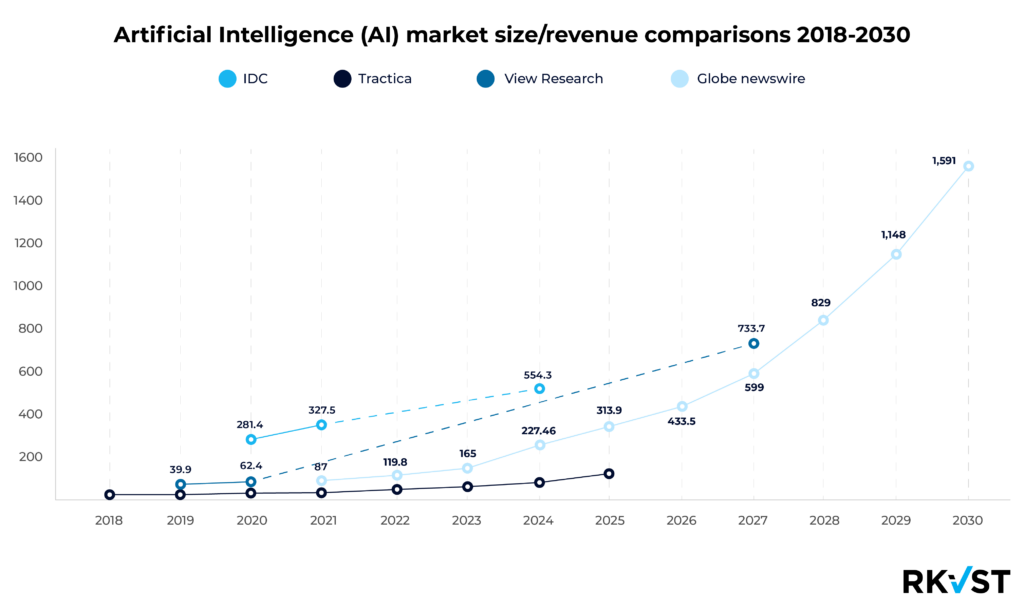
One thing is for sure: the global artificial intelligence market keeps growing
Its current value, around 200 billion US dollars, is poised to experience a tenfold increase by the year 2030, reaching a staggering two trillion US dollars.
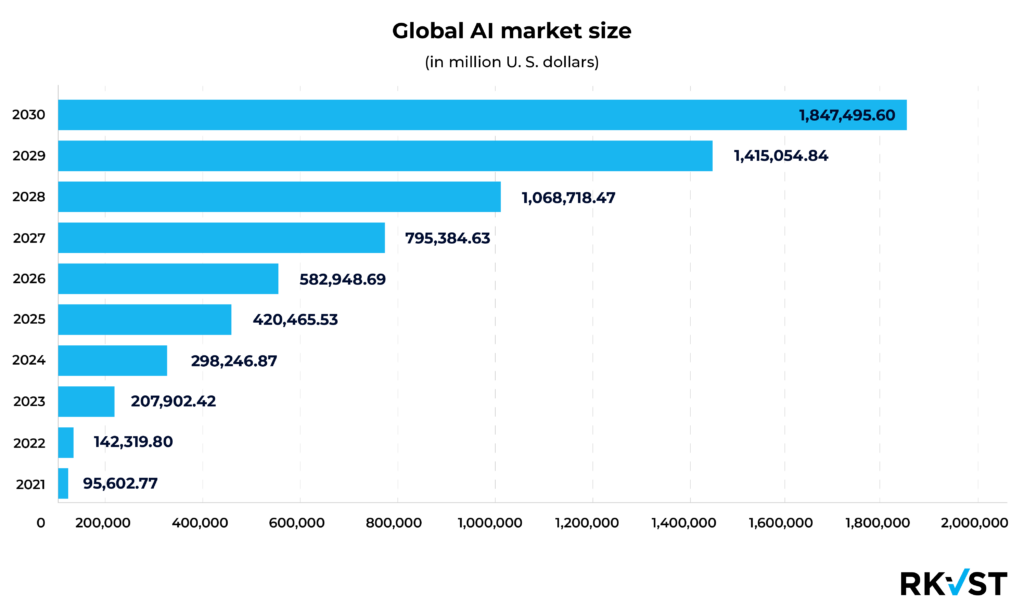
In 2022, the global explainable artificial intelligence (XAI) market experienced significant growth in valuation
The worldwide market for explainable artificial intelligence (XAI) was estimated at 5.1 billion US dollars in 2022. Projections suggest that by 2030, the market is anticipated to exceed a staggering value of 24 billion US dollars.
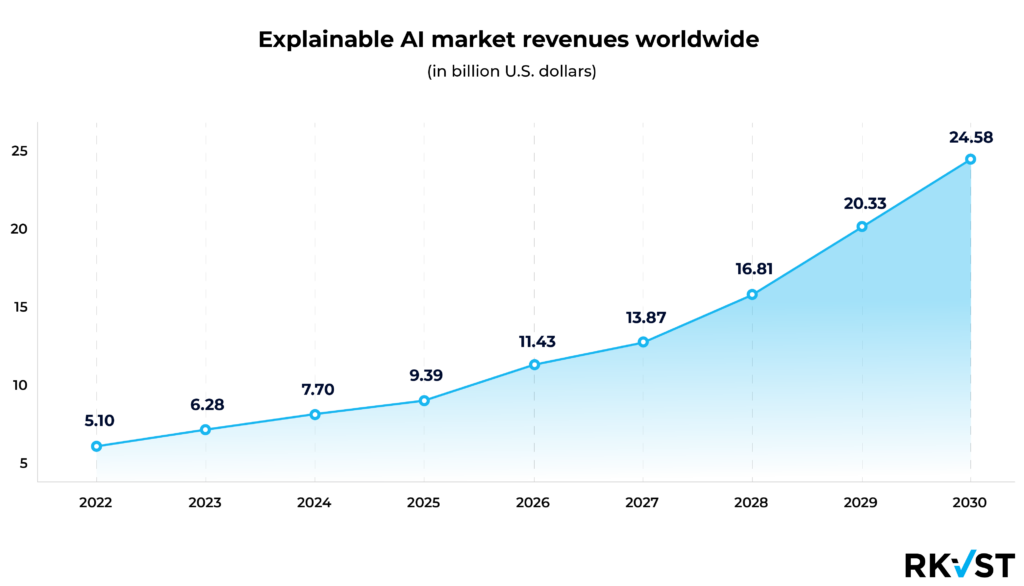
AI-powered robots have found applications across a wide spectrum of industries, spanning from retail to defense
The market is poised for substantial growth in the coming decade, growing tenfold between 2021 and 2030. Forecasts indicate it will reach 12.8 million US dollars by 2023.
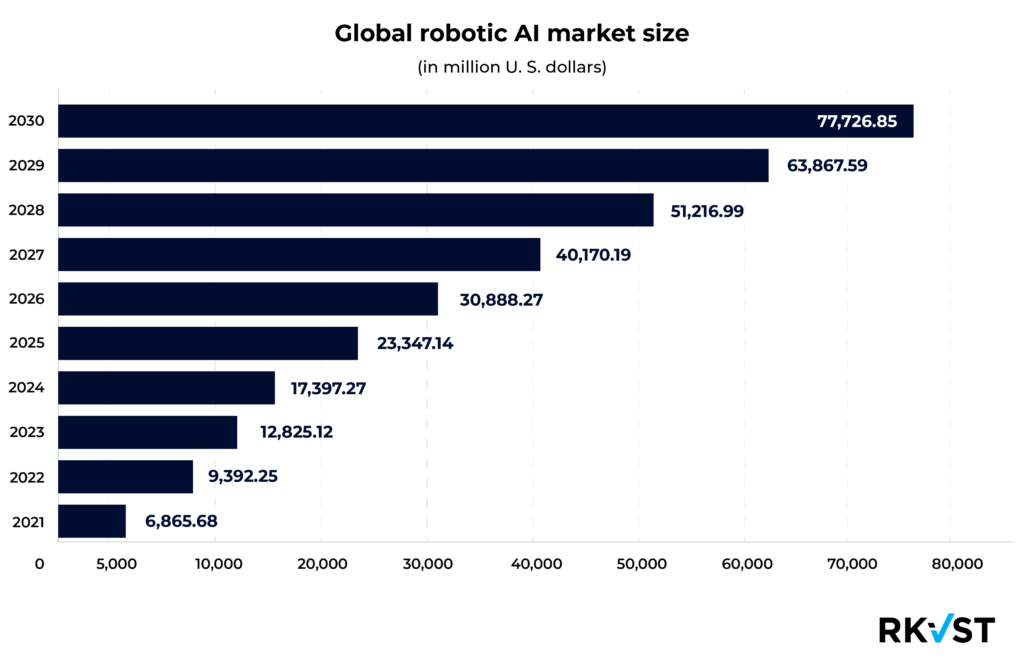
The chatbot market will also witness a remarkable growth from its 2016 market size to an anticipated figure in 2025
The chatbot market is expected to surge to approximately 1.25 billion US dollars by 2025, significantly rising from its 2016 market size of 190.8 million US dollars.
An overwhelming majority of business leaders believe that AI will play a crucial role in achieving business success over the next five years
Ninety-four percent of business leaders see AI as vital for achieving business success in the coming five years. 6 in 10 executives are enthusiastic about leveraging generative AI, with plans to initiate pilot projects or incorporate it into their operations by 2024.

AI technology has the potential to make a significant contribution to the global economy, estimated to be worth trillions of dollars by 2030
AI technology can add a substantial $15.7 trillion to the global economy by 2030, resulting in a potential increase of up to 26% in China’s GDP and 14.5% in North America. These regions collectively represent nearly 70% of the projected global economic gains.
Artificial Intelligence Adoption
The widespread adoption of AI technologies, spanning from chatbots to image generators, has driven significant progress and set in motion a surge of innovation across diverse industries.
In 2022, its adoption rate saw an approximately 2.5-fold increase compared to 2017
A significant portion of this can be credited to the growing recognition of AI as an essential tool for enhancing business operations in 2022. As a result, the global adoption rate has reached 50%.

AI is widely employed in service operations, corporate strategy, and finance across industries, with around 20% usage reported in these functions
The highest utilization of AI in product development occurred within the financial services sector, with more than 30% of respondents incorporating AI in 2022.
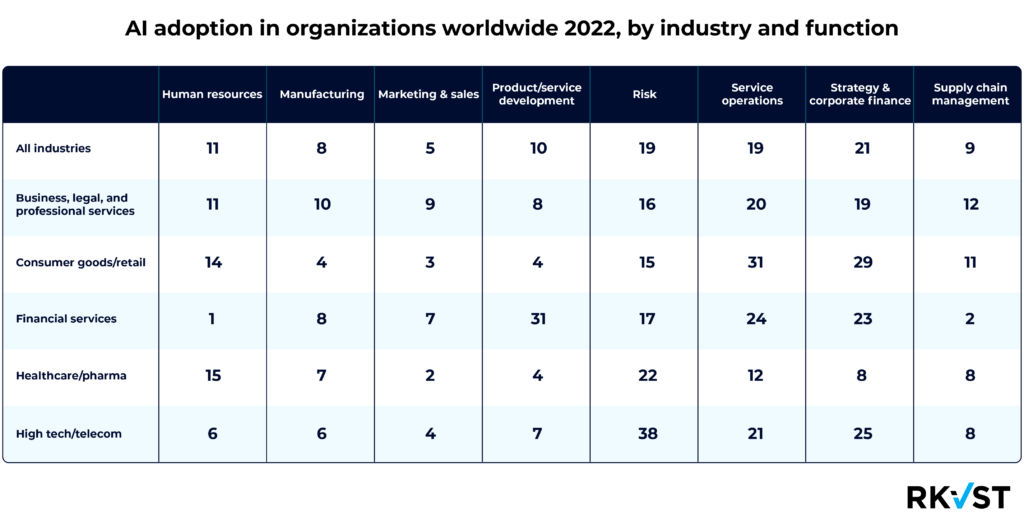
AI has demonstrated its substantial transformative potential in the upcoming digital age
Prominent technology companies such as Amazon.com, Google LLC, Apple Inc., Facebook, IBM, and Microsoft are making substantial investments in AI research and development. In a significant move, McDonald’s allocated its largest tech investment of $300 million to acquire an AI startup in Tel Aviv, aiming to deliver personalized customer experiences through artificial intelligence.
The leading process is robotic process automation
The primary method in use is robotic process automation, accounting for 39%. In simple terms, this involves automating routine and repetitive aspects of business operations, eliminating the need for continuous human oversight.
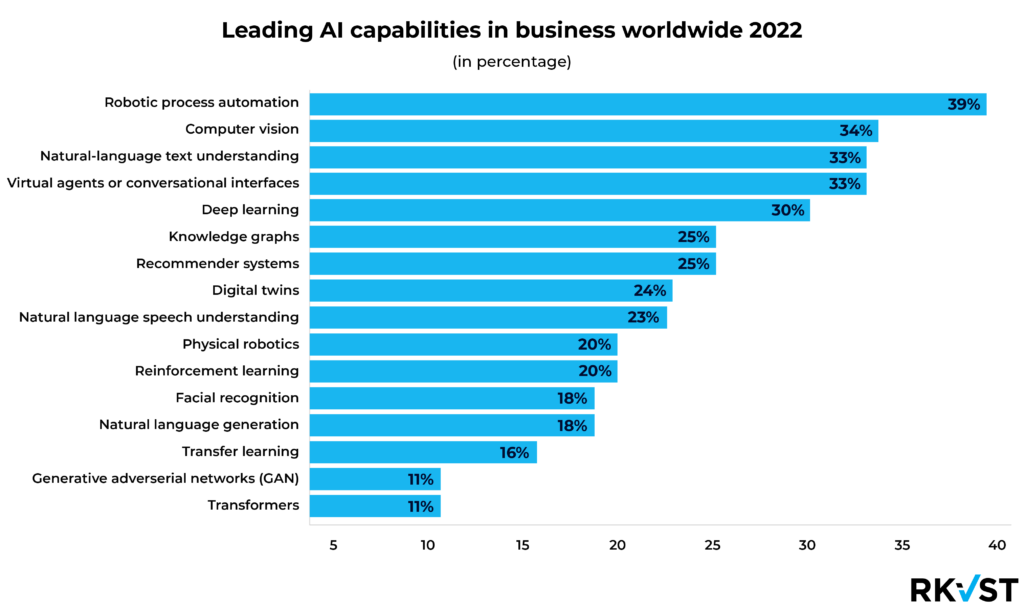
Businesses Using Artificial Intelligence
Technology has consistently played a crucial role in the business industry, but artificial intelligence (AI) has elevated technology to a central position within organizations. Whether it’s self-driving cars or critical life-saving medical equipment, AI is now integrated into nearly every device and software application.
Companies are employing AI in a broad spectrum of domains
The most frequently used applications involve customer service, with 56% of participants employing AI in this context, and cybersecurity and fraud management, embraced by 51% of enterprises.
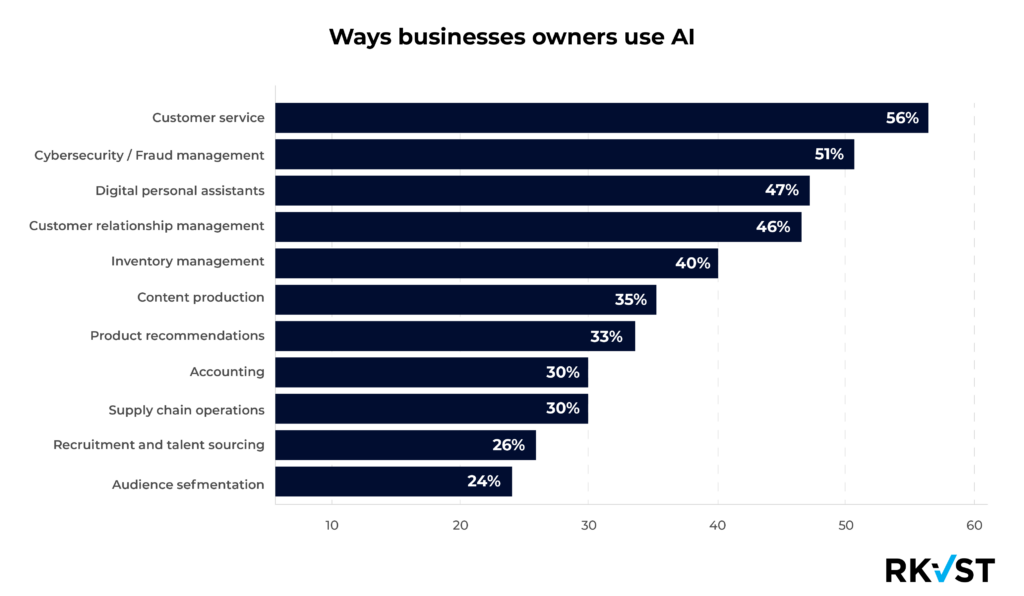
Most CEOs are confident that their teams possess the necessary generative AI capabilities, while that is not what the C-suite team members believe
Nearly three out of four CEOs are confident that their teams possess the necessary generative AI capabilities, while only around three in ten members of their C-suite teams share this perspective.
The anticipated trend is a quadrupling of investments in generative AI within the next 2 to 3 years
Business leaders anticipate increasing their investments in AI ethics by a minimum of 40% in the coming years. Additionally, almost two-thirds of them acknowledge feeling investor-driven pressure to expedite the implementation of generative AI.
By automating operations, teams can consistently and continuously ensure cost-efficient application performance
In the next three years, 80% of executives plan to implement automation in their IT networking, and 76% intend to do the same in IT operations management. Additionally, 69% are looking to integrate robotic process automation (RPA) into their operations.

As businesses prioritize sustainability in their growth strategy, they recognize that dependable data is essential for their sustainability efforts
Almost half of executives (46%) consider AI crucial for enhancing their organization’s reporting and performance. Furthermore, 77% of CEOs driving significant sustainability changes anticipate digitizing their organization’s workflows and incorporating AI automation by 2025.
Companies with advanced sustainability data capabilities tend to excel over their peers in various critical domains
The top-performing companies exhibit a 5% higher return on shareholder investment, along with a 10% greater annual revenue growth rate. They are also 43% more likely to surpass their peers in profitability and 52% more inclined to attribute a significant positive impact of their ESG (Environmental, Social, and Governance) efforts on profitability.
Companies are employing AI to enhance the customer experience
Seventy-three percent of businesses are currently implementing or considering the use of AI-driven chatbots for real-time messaging. Additionally, 61% of companies leverage AI to enhance email optimization, and 55% utilize AI for tailoring personalized services, such as product suggestions.
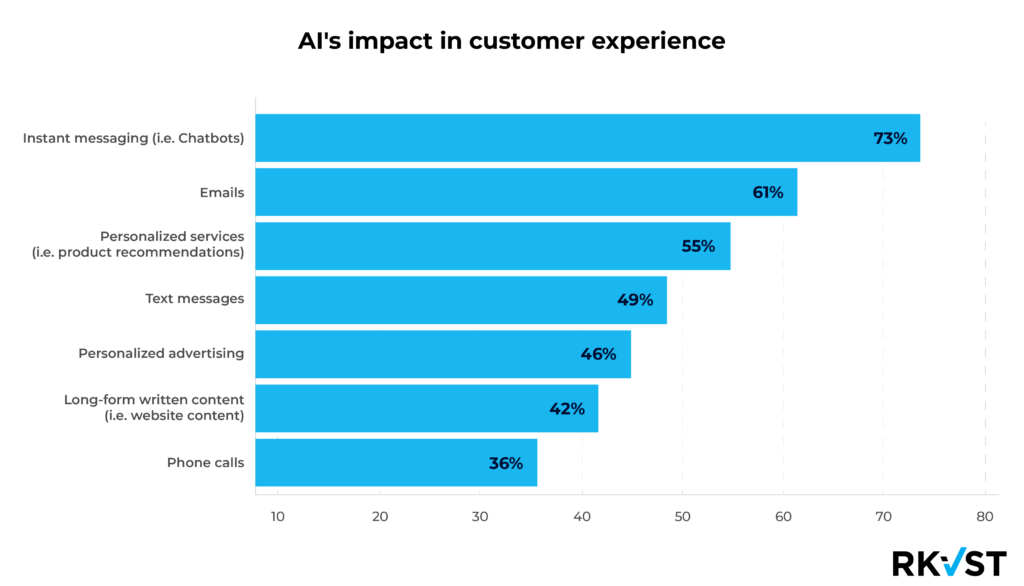
An increasing amount of research suggests that organizations adopting security AI and automation technologies are experiencing substantial operational improvements
Companies that have reached the highest level of maturity in their security AI and automation capabilities enjoy a 40% greater return on their investment in security (ROSI).
The majority of advanced adopters are using AI to decrease their operational expenses
Over 85% of advanced adopters are utilizing AI to lower their operational expenses. Organizations that have fully implemented security AI and automation have, on average, decreased their data breach expenses by $3 million.
Security AI and automation capabilities also result in substantial time savings
When an organization requires 230 calendar days to detect, respond to, and recover from cyber incidents, integrating security AI and automation can reduce this period by as much as 99 days.
AI is increasingly consuming a larger share of IT budgets
Global expenditures on AI-focused systems are projected to reach $154 billion this year, representing a 27% increase from 2022. Companies at the forefront of AI implementation achieve a 13% return on investment (ROI) for their AI projects, more than double the average ROI of 5.9%.
Artificial intelligence is enhancing and optimizing business operations
AI finds application or is on the agenda for deployment across various facets of business administration. A notable proportion of businesses (53%) employ AI to enhance production processes, while 51% integrate AI for automating operations, and 52% harness its capabilities for tasks related to search engine optimization, including keyword research.
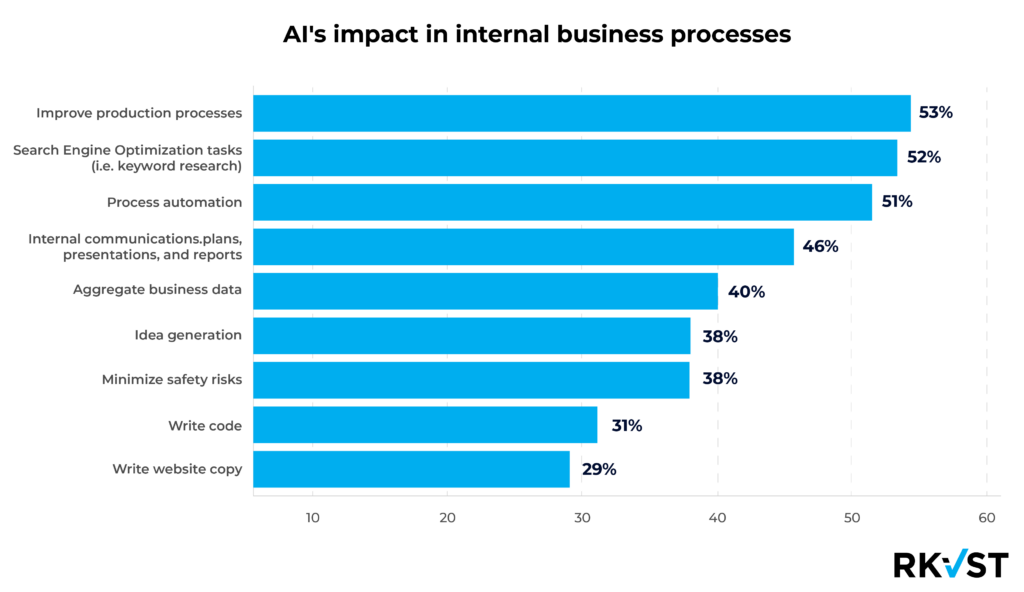
Most business owners anticipate a favorable influence of AI on their businesses
The majority of business owners believe that artificial intelligence will be advantageous for their enterprises. A significant portion of those surveyed (64%) foresees AI enhancing customer relationships and boosting productivity, and 60% anticipate AI driving an increase in sales.
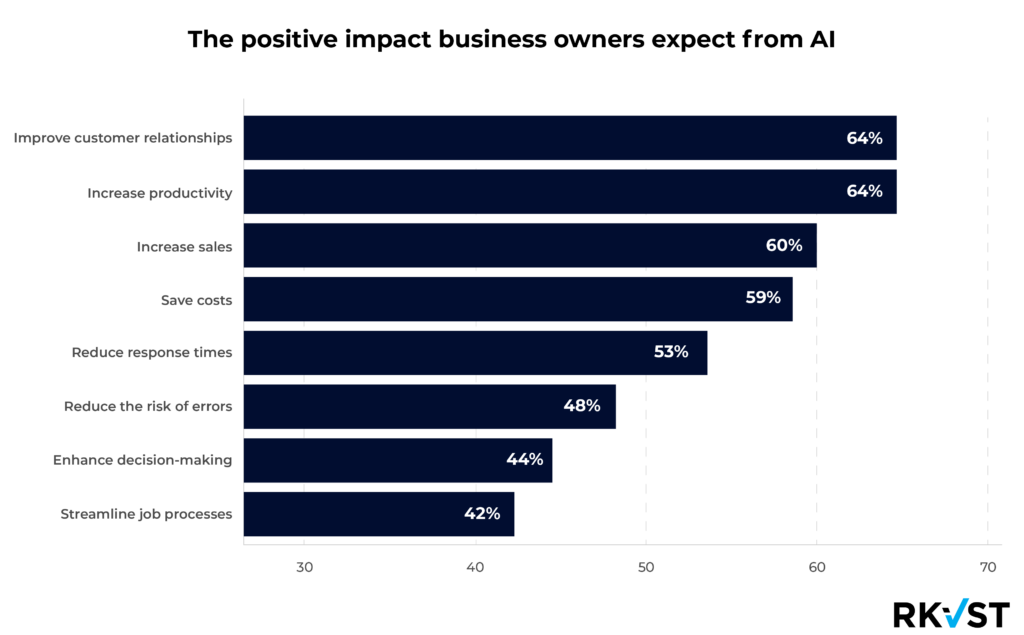
A concern companies share is how AI might affect the volume of website visitors from search engines
24% of companies are concerned about the potential influence of AI on their business’s visibility in search engine results.
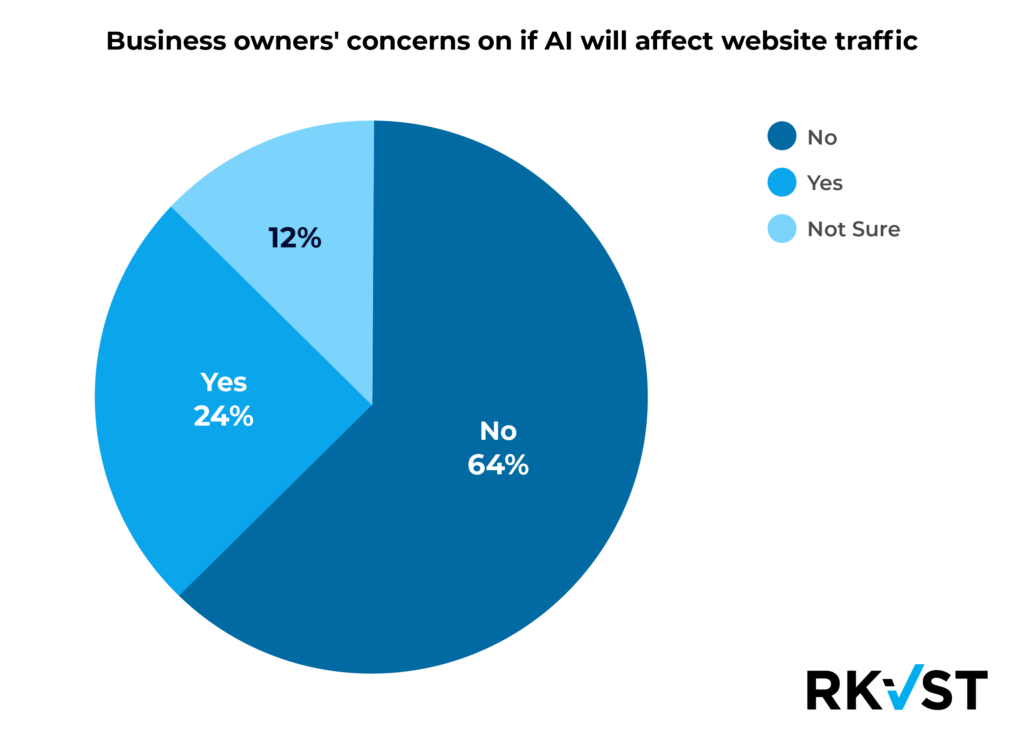
Business owners also have other concerns regarding AI
More than 40% of business owners worry about dependence on technology and approximately one-third express concerns about AI leading to a reduction in the workforce.
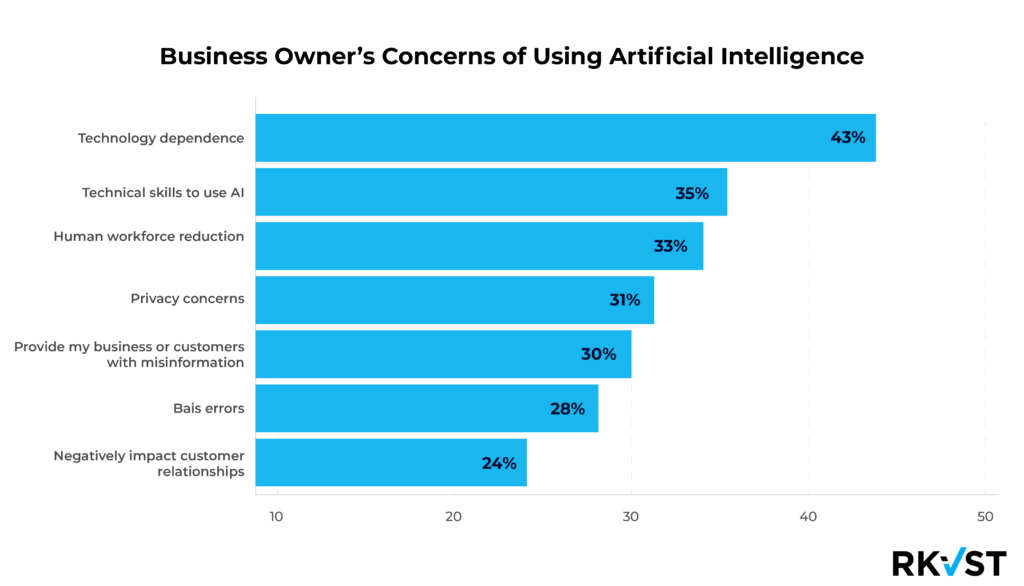
Executives emphasize three main hurdles when it comes to implementing generative AI
The three key challenges mentioned by executives for implementing generative AI are cybersecurity at 53%, privacy at 51%, and accuracy at 47%.
The Impact of AI on Employment
While AI has the potential to automate certain tasks and improve efficiency, it also raises questions about job displacement and the need for reskilling the workforce to adapt to the changing landscape.
One in four companies is embracing AI in response to shortages in labor or skills
With labor shortages becoming an urgent issue, a quarter of companies are leveraging AI adoption as a solution, as reported by IBM. AI aids businesses in streamlining operations and filling the gap created by the lack of human resources.
A significant majority of people express worries about artificial intelligence leading to employment reductions
A considerable 77% of individuals have voiced their concerns regarding AI potentially leading to job displacement, underscoring widespread fear about technology’s influence on future employment prospects.
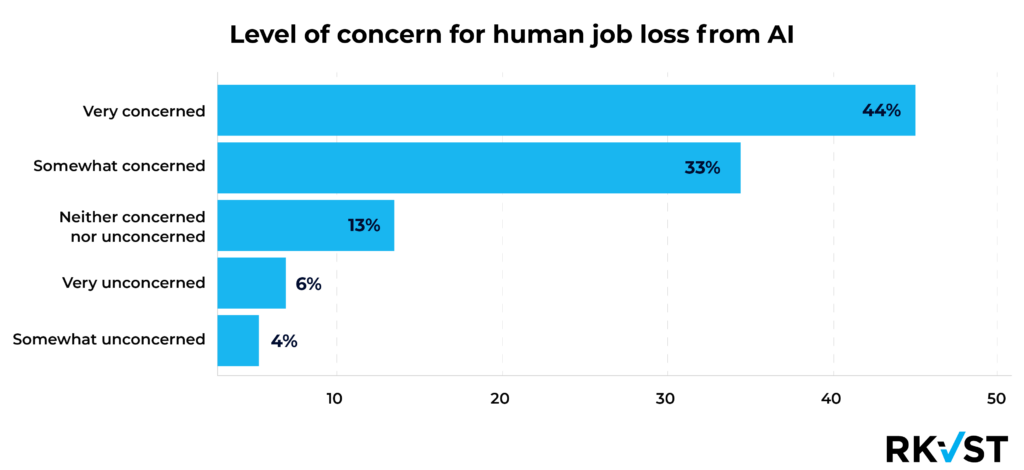
Generative AI enhances and uplifts job roles, emphasizing the importance of both human expertise and technological skills for the future workforce
Executives anticipate enhancing and elevating a significantly larger number of employees in all areas compared to those they intend to replace. Specifically, they plan to automate only 13% of roles, while the remaining 87% will be augmented or elevated.
The rise of generative AI brings new risks, emphasizing the essential requirement for strong governance and compliance measures.
Sixty-seven percent of executives express apprehension regarding operational risks that could lead to potential liabilities.
AI Trust and User Sentiment
With AI integration becoming more prevalent in businesses, understanding consumer sentiment will likely be useful in how companies make decisions regarding AI in the years ahead.
Most consumers are concerned about AI usage by businesses
Consumers express concern about businesses using AI, especially when it comes to product descriptions(70%) and reviews (60%).
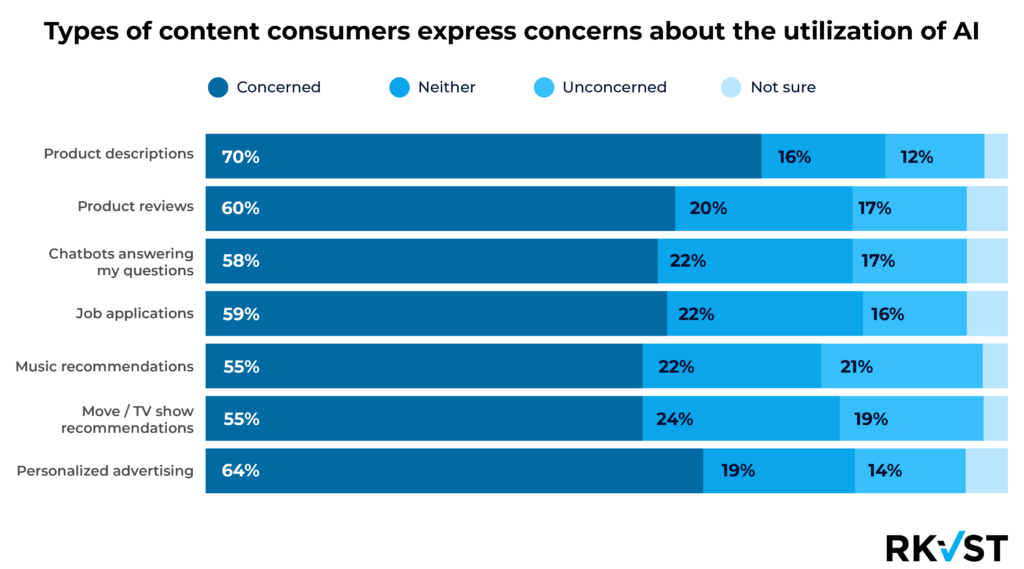
A majority of consumers indicate that they will continue to trust companies that use AI
Despite reservations surrounding the utilization of AI, a considerable 65% of consumers maintain trust in businesses that incorporate AI technology. This implies that when companies employ AI responsibly and with transparency, they can uphold consumer confidence and leverage AI’s capacity to enhance customer experiences.
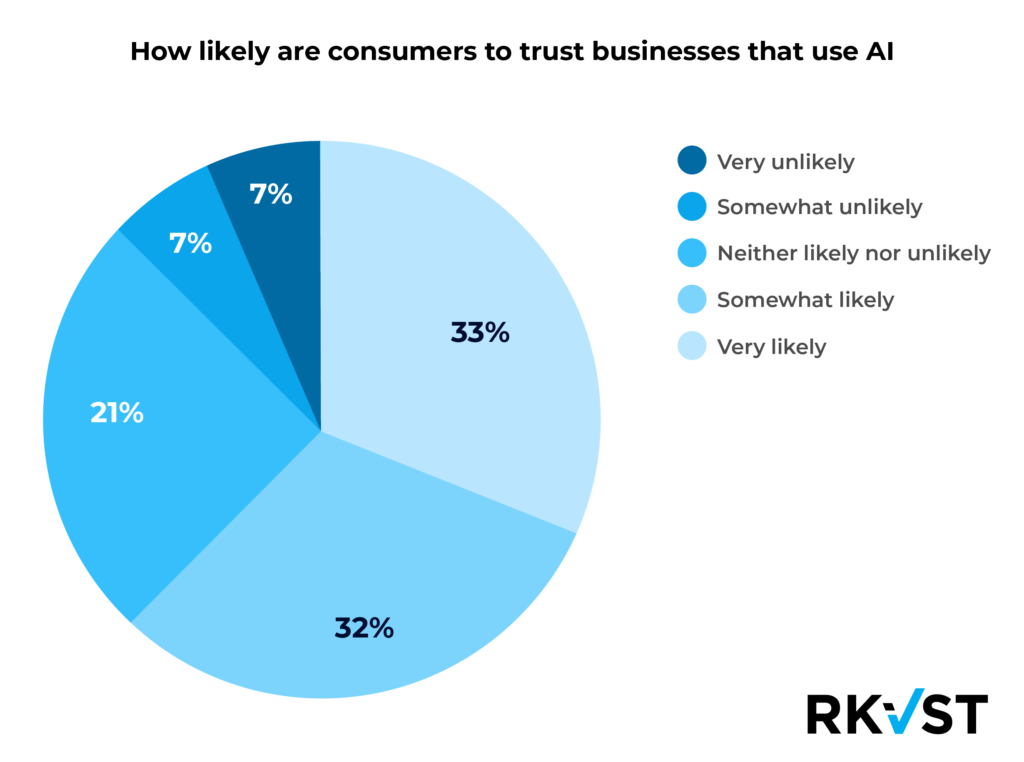
A majority holds the belief that AI will enhance the quality of written content
More than half (54%) believe that AI has the capability to enhance written content. This suggests that AI-driven solutions like ChatGPT hold promise for improving text quality, creativity, and efficiency across various content creation scenarios.
Studies suggest growing consumer preference for using AI language models like ChatGPT to retrieve information and answers
A majority of respondents (67%) in a Forbes study expressed their likelihood to opt for ChatGPT or similar tools over conventional search engines like Google. More specifically, 37% stated they were highly inclined to do so, while 30% expressed moderate likelihood. In contrast, 15% remained neutral, and a combined 18% had varying degrees of reluctance to use AI language models instead of search engines.
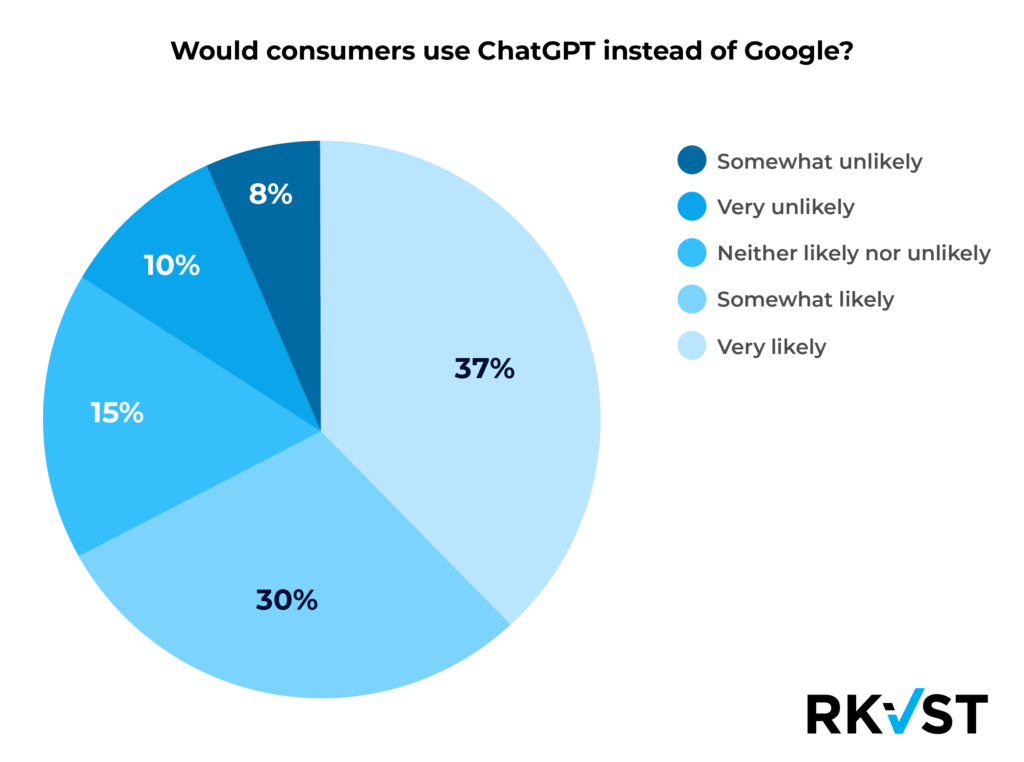
Findings indicate a keen interest among individuals in employing AI to aid with their day-to-day activities
Individuals intend to utilize AI tools for responding to messages from friends and colleagues (45%), seeking answers to financial queries (43%), and creating travel plans (38%).
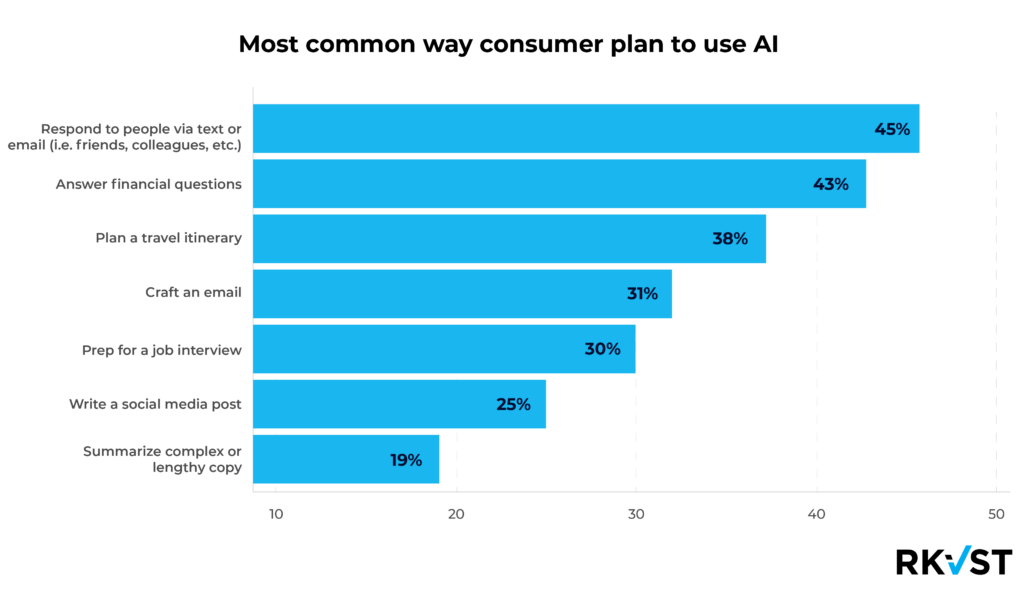
A significant majority, well over 75%, are concerned about AI-generated misinformation.
Concerns about misinformation are prominent among consumers regarding the incorporation of AI in businesses. Data indicates that a total of 76% of respondents express apprehension about AI potentially leading to misinformation on a company’s website, with 43% having strong concerns and 33% holding moderate concerns.
Using tools like Instaproof offers the necessary data traceability and transparency for businesses in the modern era, enabling them to confirm the origin and legitimacy of data, even when dealing with highly confidential information like AI and extremely sensitive data.
Consumers see AI’s potential to enhance the customer experience, allowing businesses to exceed expectations.
Fifty-three percent of respondents saw room for enhancement in instant messaging, including chatbots, while 46% and 48%, respectively, thought that text messages and emails could also benefit from AI integration.
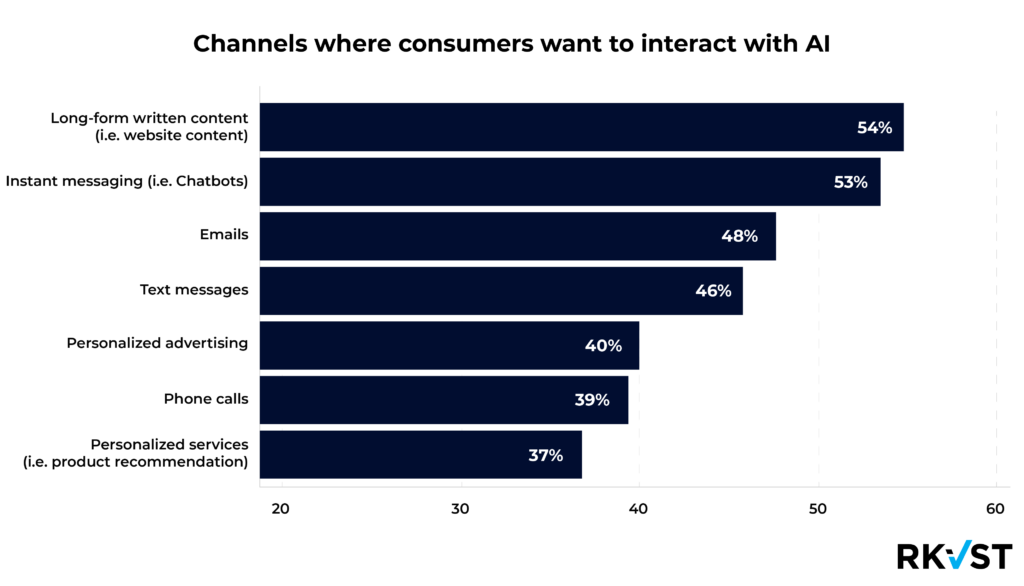
Consumer comfort with AI analyzing diverse personal data varies, and businesses should consider this when implementing AI to maintain trust and privacy.
The majority of participants, 55%, felt at ease with AI examining their social media activity and involvement. Approximately 48% expressed approval for AI analyzing their past purchases, behaviors, as well as their driving habits and destinations.
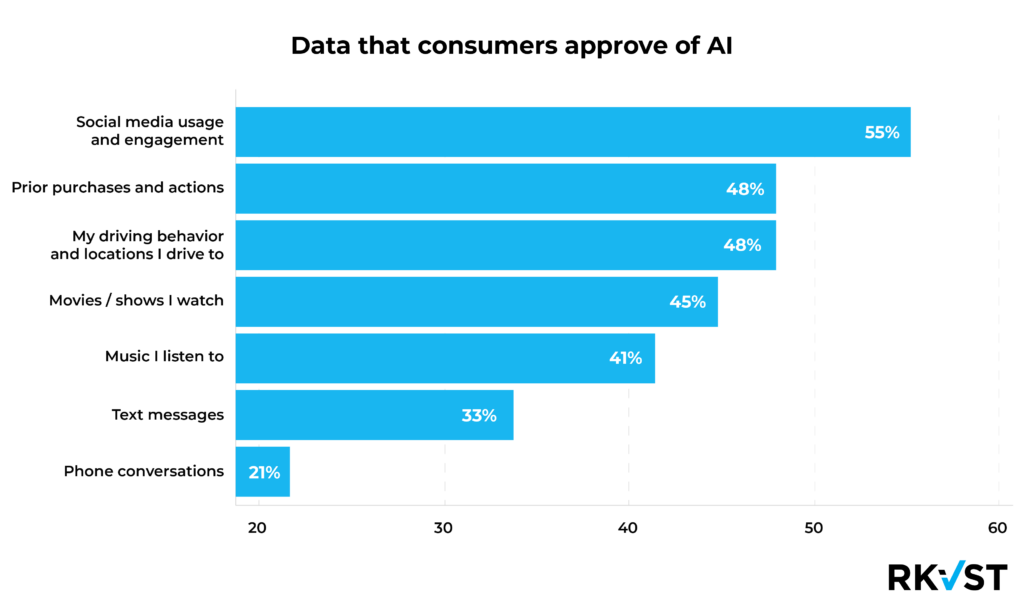
AI’s Future Projections
We are witnessing unexpected applications of AI beyond the realms of technology and marketing.
AI is capable of forecasting cancer survival
Researchers at the University of British Columbia and BC Cancer have engineered AI capable of forecasting cancer survival with an impressive 80% accuracy rate, achieved by analyzing doctors’ notes.
AI tools are revolutionizing drug development
A groundbreaking AI tool can now anticipate the structures of a staggering 200 million proteins. This can potentially revolutionize drug development, as many drugs rely on understanding these protein structures.
Emotion AI holds promise for conducting mental health assessments and diagnosing
Emotion AI, leveraging natural language processing (NLP) to detect human emotions within text, stands poised for integration into healthcare apps. These applications could assist doctors in assessing and monitoring patients’ emotional well-being, particularly those with neurodiverse conditions.
The Bottom Line
To conclude, these statistics illuminate the expanding influence of artificial intelligence. These numbers emphasize the importance of responsible AI implementation and data privacy in an increasingly AI-driven world. Staying informed about these trends is crucial for individuals and businesses as we navigate the evolving landscape of AI technology.
Sources
Statista
IBM
Forbes
McKinsey & Company
Research and Markets
Grand View Research
PwC
Next Move Strategy Consulting
Deloitte






